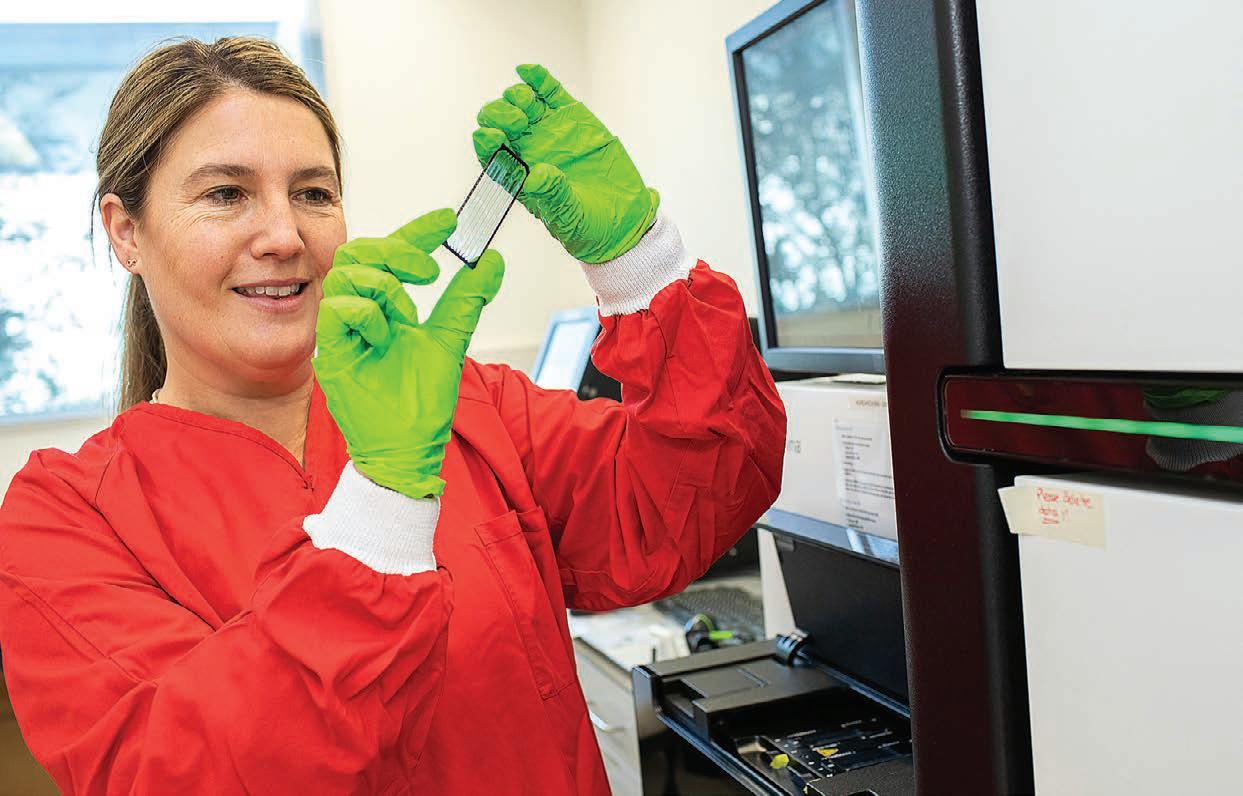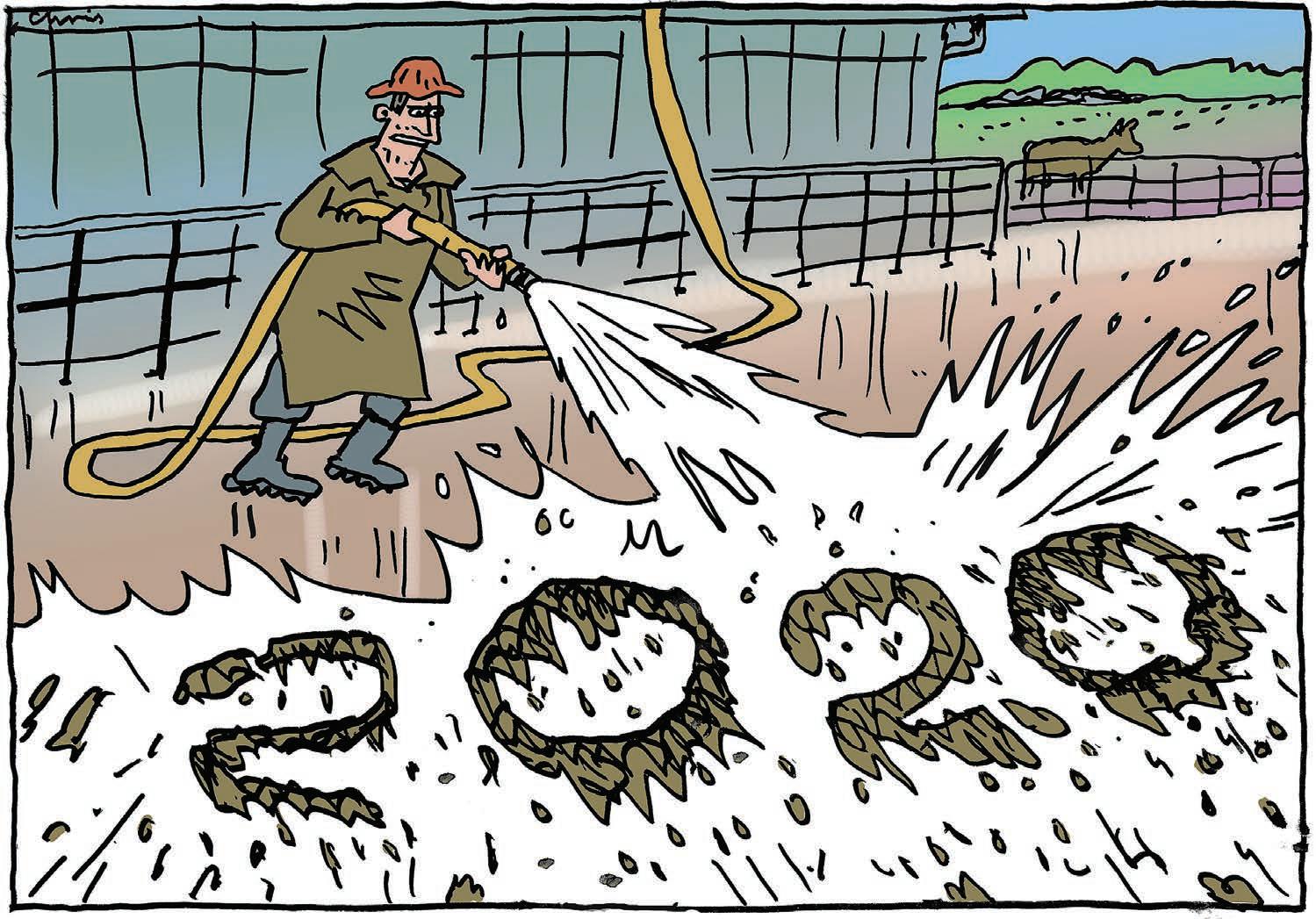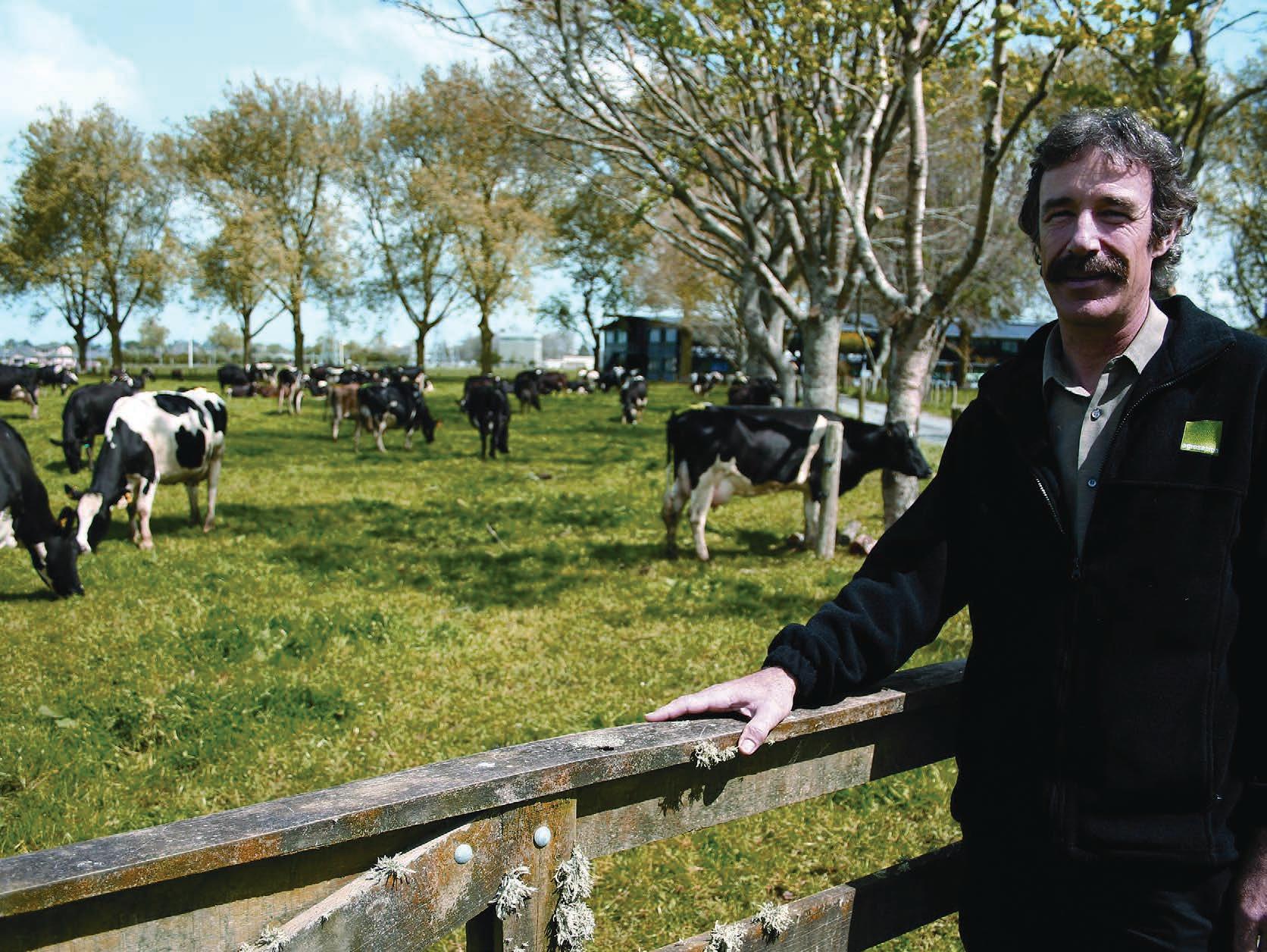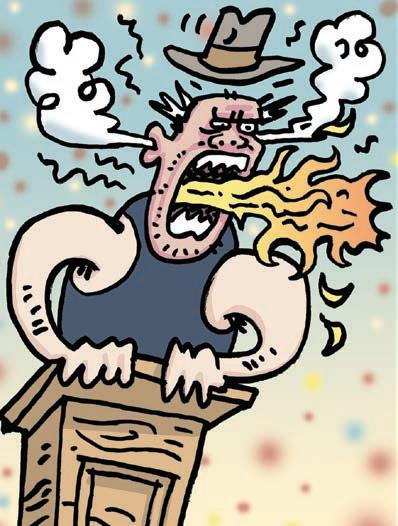
12 minute read
Opinion
The best and the worst of 2020
Alternative View
Alan Emerson
WE’LL all remember 2020. Lockdown in New Zealand wasn’t that bad and the community was great. As a country we played ball, which certainly paid off. But what impressed me most was the teamwork at the top.
Politically the leadership was impressive and the bureaucracy excelled. I’ve found over the years that many top civil servants had their own agendas, which could be vastly different from their political leaders. Also patch protection was paramount.
What I’ll remember from 2020 is that our top bureaucrats put personal agendas and patch protection aside for the common good. It was great to see.
So, the Emmy Awards for 2020 goes to:
The Contemptibles
Those multinationals that paid little tax here and claimed the covid-19 wage subsidy. Companies included Coca Cola, McDonald’s, Mercedes Benz and Samsung. They effectively took NZ taxpayer dollars and sent their profits offshore.
The Arrogant
Those who claimed the subsidy and didn’t need it. Companies included Fletcher Building, Sky City and Harvey Norman.
Supreme Idiocy
The Auckland Business Chamber who back in July insisted our borders with Australia were opened. Chief executive Michael Barnett wrote an article supporting their position claiming
From the Ridge Steve Wyn-Harris
I HAVEN’T put pen to paper for a year now, but you should remember me as the tiny pup the boss found in the watertable that had been dumped by some loser.
Originally believed to be a Rottie, but a definite huntaway, although on the shaggy side.
I’ve been around for a few years and am currently the only working dog on the farm so I’ve become his mainstay.
Gin, who had been top dog for a long time, had a big operation a couple of years ago to remove some tumours and had been fully retired since but enjoying herself.
Some more tumours came back that “totally eliminating the contagion is unrealistic and simply not backed by science.” How he knew he didn’t say.
Supreme Idiocy Runner-Up
The then National leader Todd Muller who claimed in June that it was “untenable” for the nation to remain “locked up” for months awaiting a vaccine.
The Circus
Some of the early commentary on covid-19.
We were told that the cause was the 5G network. Then it was suggested that older people in lockdown could lose their cognitive ability, meaning going nuts. I’m unaware of any who did.
Another academic colossus suggested rural towns would be more prone to covid-19 because of their low socio-economic status, more elderly and less access to health services.
Stay in the shallow end, matey, our health system in the Wairarapa is great and I’ve seen beggars in Auckland and Wellington but not here. With this comment you made me know one thing: you weren’t educated at Greymouth Tech or Lincoln University.
We also had the ubiquitous Mike Hosking demanding a lockdown and when that happened, claimed it was an overreaction.
With Non-covid Awards, there’s the Donald Duck for quacking me up
The disciples of regenerative agriculture. Let’s get both science and financials in there rather than fads.
Sideshow Award
The National Party and it was continuous. Jamie-Lee Ross, Michelle Boag, Hamish Walker and Andrew Falloon, it kept coming.
The leadership saga added to the sideshow.
We had Simon Bridges doing what I thought was a good job in difficult circumstances, then Todd Muller taking National so before Christmas she went back to the vet and after a deep and difficult discussion the boss and vet decided another big operation on an old dog wasn’t fair, so she came home in a tasteful shroud and Steve buried her next to her parents.
Interestingly, Kiwis recently overwhelmingly voted for a much less draconian version of euthanasia than they practice on us, but a measure designed to reduce suffering all the same.
I was interested to hear him tell Jane that he placed a couple of dog biscuits in the grave as he always has in keeping with the traditions of the ancient Egyptians and many other cultures throughout history, to carry Gin into wherever it is we all might go next, if anywhere at all.
So that just leaves Sue, Gin’s and my daughter from a moment of inattention by Jane and wild abandon by us. Sue is very sweet and more pet dog than sheep dog but good company for me. into obscurity and now Judith Collins returning National to Muldoonism.
The Manipulated Minister Award
Then Minister of Police Stuart Nash, who blindly accepted all the police spin over gun law reform. The Act party will be forever grateful having picked up many votes from disaffected firearm owners.
The Fish Need Bicycles Relevance Award
SAFE and the Animal Law Association with their court case over farrowing crates. SAFE wants all animals out of farming, and what the endgame of Animal Law is, I have no idea.
Sow crates are there to save piglets. Kill piglets and NZ pork becomes non-competitive so we import pork from, you guessed it, countries who use sow crates with less stringent animal welfare rules than we have. Poor pigs.
Chicken Licken Award
The horticultural industry for all its bleating about needing seasonal workers but when locals stepped up they seemed, well, disorganised and uninterested.
The Whitewash Award
The Royal Commission into the mosque shootings. Thankfully, we had a separate report from the Muslim community that spelled things out a little clearer. The Believers in Santa
The Strong Wool Action Group for wanting money while providing no detailed budget.
And on the positive side, we have the Conservation Award
Only one serious contender, NZ farmers.
Finally we’re seeing sense citation.
Water storage is fashionable again. It’s also logical as without it we’re stuffed.
Landcare Research produced some excellent work on mitigating climate change. Encouraging long-
Mind you, she’s had some recent use and been OK.
I’ve had a terrible start to the year. The boss thought he’d reward me with the left-over ham bone from Christmas. It was delicious. But not a good idea. He has never seen so much material come out of any animal and from both ends, sometimes at the same time. A google showed that dogs should never ever be fed ham bones due to them being cooked and the preservatives. It can be fatal. He was surprised he had never known this and polled several other farmers with the majority knowing not to do it, while others were oblivious. I was lucky to survive.
Just got over that and now I’ve had an operation on my foot as one of my toenails got infected, so I’m on furlough.
Earlier last year I watched the old fella work his way through what was a nasty drought. He did okay given it was about his ninth, so he has flexible and conservative stock policies, but he felt sorry for
SURF’S UP: Wairarapa farming leader George Moore showing you’re never too old to learn new tricks.
term strategic adaptation, such as diversifying cultivars, shifting sowing dates and planting more shade and shelter. We can have a viable food production sector in a changing climate and that is good news, but we need water to do it.
Good On Ya Mate Award
Surfing for Farmers founder Stephen Thomson. What a great way to get farmers off the farm and, in many cases, getting right out of their comfort zone. Locally we had over 30 turning up, some travelling upwards of 80km. those dealing with it for the first time and the many who live in districts where they don’t usually have dry summers and are set up to capitalise on what is usually a good season for them.
You wouldn’t know that last
The boss thought he’d reward me with the left-over ham bone from Christmas. It was delicious. But not a good idea. year was a dry one now. This place looks like a hay paddock full of thistles and the boss isn’t showing it off to anyone.
He calls it “deferred grazing” but he’s not kidding anyone including himself.
All the humans could talk about last year was some sort of parvovirus. One must wonder what all the important news and
Supreme Award
Federated Farmers – again. They’ve represented rural interests amazingly well and positioned farming in the political arena superbly. It isn’t easy but they did it. In addition, the agricultural summit they organised was a
Your View
Alan Emerson is a semi-retired Wairarapa farmer and businessman: dath.emerson@gmail.com
Ditch’s Diary: A terrible start to 2021
superb event. happenings in the past that filled the media which immediately was replaced by the pandemic story and has since gone unnoticed.
He has been talking about the goings on in a place called the United States, which he says is anything but united. He’s not surprised it has come to this as he says the guy who has been inciting the discontent is not well, but he is saddened for the country and the people in it. And he says if it can happen there, it could happen anywhere.
He says these are interesting but uncertain times.
I don’t bother about any of this.
All I want is my foot to come right so I can get back to work, a good feed every night, clean water, a comfy kennel, and a pat most days.
COMMITTED: The latest Red Meat Sector Strategy indicates firmly B+LNZ and MIA, representing both sides of the farm gate, are fully aligned in their objectives. Photo: NZ Story/Paul Sutherland Photography

Meat strategy refresh achievable
Meaty Matters
Allan Barber
MEAT Industry Association (MIA) chief executive Sirma Karapeeva says the new Red Meat Sector (RMS) Strategy is not radically different from the 2011 version and terms it “a renewal of the vows rather than a new marriage.”
Beef + Lamb New Zealand (B+LNZ) lead Nick Beeby agrees the whole purpose is to refresh the previous strategy by taking stock of achievements and charting a new path in a changed world.
Although some of the sector’s challenges have remained as they were nine years ago, much has changed and demands a fresh approach.
The global trade environment is dramatically different today, while consumer preferences, post-covid distribution platforms and a growing trend towards agricultural activism place greater emphasis on analysis, environmental awareness and flexibility.
The main point MIA and B+LNZ agree on is the importance of both sides of the meat industry collaborating to ensure alignment of objectives to the overall benefit of the sector. In total contrast to 10 years ago, the parties now recognise the challenges and opportunities are greater than a single company or organisation can address and are now completely aligned on the priorities to be addressed.
Over the past 50 years, the red meat sector has come in for plenty of criticism, much of it justified, while farmers and processors battled for individual survival in the face of massive challenges: Great Britain’s membership of the EU, the removal of subsidies, farm receiverships, a dramatically reducing sheep flock, incessant land use change, decline of wool prices, continuously changing consumer tastes, droughts and floods, and more recently a raft of new regulations.
During the same period farmer representative bodies have at times struggled to identify what their members expect and require of them, while industry organisations like the MIA are only as effective as their members want and allow them to be. The latest RMS strategy indicates firmly B+LNZ and MIA, representing both sides of the farm gate, are fully aligned in their objectives, while B+LNZ’s own strategy will flow from the sector strategy and will inform the referendum proposition to be presented to levy payers next year.
Beeby is adamant if the sector is to be successful, it cannot be about behind or in front of the farm gate, but must be a total partnership. He refers with enthusiasm to the joint work on the NZ Farm Assurance Programme, while Taste Pure Nature and Red Meat Profit Partnership are two more examples of collaboration between the two organisations.
The RMS document, subtitled Growing Sustainable Value Together, talks of providing a platform of shared aspirations with other partners, including the dairy sector, Maori, other primary sectors and the NZ government. The sector’s value to the economy is demonstrated by the 92,000 people it employs directly and indirectly, its status as the country’s second highest exporter selling over $9 billion of products to 120 countries, 98% of which is value added, and the importance to the total of product subsets such as halal certified processing and co-products.
The strategy sets four 10-year goals – to achieve sustainable profitability and premium value, to support vibrant communities and be seen as trusted guardians of the sector’s integrity and reputation for caring for its land, water and animals – and three specific priorities for 2025 relating to market position, innovation and sustainability. The most noteworthy aspect of these goals and priorities is the clear identification of whose responsibility each activity is, either joint or individual, whereas in the past true accountability would have been more difficult to pin down. To assist the process of achieving the priorities within the five-year timeframe, there are clearly stated objectives to be completed by 2022, each with concise measurement criteria.
The three priorities are closely linked and none is achievable on its own. Market position incorporates market access, farm assurance, product differentiation, attributes and benefits, seeking to build collectively on NZ’s reputation for healthy, grass-fed, lean red meat, its production systems, animal welfare and sciencebacked nutritional benefits.
Innovation captures developments of the farms, processing plants and products of the future, all of which will be supported by enhanced data integration and analysis, and eventually full farm to fork traceability. All this work will be underpinned by the three pillars of economic, social and environmental sustainability.
Key aspects of sustainability include attracting skilled and adaptable people across the agricultural value chain, strengthening the sector’s reputation with the NZ public, improving environmental performance to achieve the targets committed to in He Waka Eke Noa, contributing to world class biosecurity protection systems and improving lifetime animal care through high welfare standards and scientific research into animal health.
The impressive thing about RMS 2020 is the amount of work underway already, which makes achieving many of the stated outcomes more likely. Beeby draws attention to the importance of what are termed “enablers” in the strategy document. The seven enablers are collaboration, future insights, food safety, data connectivity, comprehensive science and evidence, skills and capability development, and open markets. The first of these should be readily available, although food safety requires careful attention at all times. The last two appear more uncertain – open markets have been a growing feature of world trade for 30 years, but have come under threat over the past few years, while skills and capability development remains a major problem.
Quite simply there aren’t enough New Zealanders willing to study the relevant disciplines, nor can we expect to be able to import people to make up the shortfall, whether because of covid-19 or government policy.
This sector strategy is clear, concise and achievable. The sector can move into the next five years with confidence its leaders have correctly defined the issues and goals that will guarantee success.








